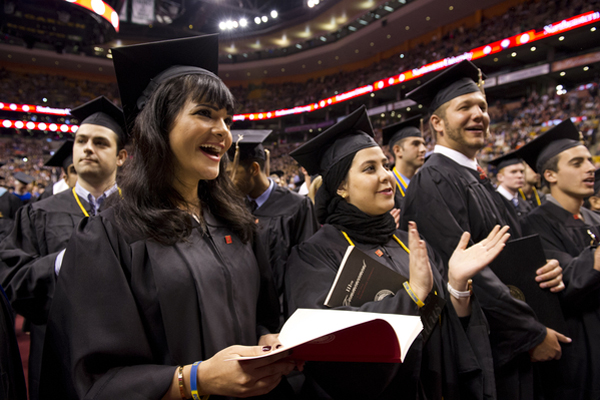Most Americans and business leaders want colleges to provide a broad-based education

As many policymakers and business leaders advance the need for education focused on science, technology, engineering, and math, a new national survey reveals that most Americans, and particularly hiring decision-makers, believe that broadly applicable skills such as writing and problem-solving are preferable to specific industry expertise.
According to the Northeastern University survey, nearly two-thirds of Americans (65 percent) and almost three-quarters of hiring decision-makers (73 percent) believe that being well-rounded with a range of knowledge is more important than possessing industry-specific skills.
The survey findings also provide a wake-up call for leaders of colleges and universities on the important issue of higher education outcomes. Almost two-thirds (62 percent) of Americans say that the higher education system is doing a “fair” or “poor” job of preparing recent college graduates for the workforce.
However, Americans continue to believe higher education is critical to achieving career success. A large majority (70 percent) say that a person’s level of education is the most important factor in a job candidate’s success in the employment market. Nearly three in four Americans (74 percent) believe that a college degree is more important today than it was for their parents’ generation, by far exceeding other factors such as current economic conditions, socioeconomic status, nationality, and race.
“As the nation turns its focus to higher education outcomes, we see that the American system has many strengths, but also many opportunities for improvement and innovation,” said Joseph E. Aoun, president of Northeastern University. “The best attributes of American higher education—its diversity and competitive dynamic—are precisely the qualities that will lead to much-needed innovations.”
Americans see a shared responsibility when it comes to preparing recent graduates for success. They believe the number one reason for employers struggling to find qualified job candidates is that companies do not invest enough in training new hires. However, hiring decision-makers say that colleges and universities are not in tune with industry needs and not preparing graduates accordingly. In fact, 55 percent of business leaders surveyed say their firms have trained recent college graduates on skills they should have learned at an academic institution.
Consistent with the findings of last year’s Northeastern survey, Americans strongly support experiential learning in which a student’s classroom education is integrated with professional work experience. Nearly nine in 10 Americans (89 percent) believe that students with work experience related to their field of study are more successful employees—and nearly three in four hiring decision-makers (74 percent) agree. Among those that gained work experience during college, a large majority (82 percent) says it was valuable for their personal and professional development.
A declining percentage of Americans say that online education provides the same quality as traditional in-class learning. In Northeastern’s 2012 national survey, 49 percent responded that online programs “provide a similar quality of education,” while just 41 percent agreed with this statement in this year’s poll. Yet, more than half of Americans (52 percent) believe that online education will be just as accepted by employers in five to seven years. Forty-nine percent of hiring decision-makers agree. There is consensus among Americans and business leaders that Massive Open Online Courses will fundamentally transform the way students are educated, but less than one-third believe MOOCs provide the same quality of education as traditional, in-person courses.
Other noteworthy findings:
- A strong majority of hiring decision-makers (87 percent) believe teaching students about entrepreneurship, including how to start their own businesses, is important to prepare students for the workforce.
- A majority of Americans (64 percent) believe the federal government should grant visas to international students who graduate college in the U.S. so they can remain in the country and work, while only 41 percent of hiring decision-makers agree.
- Although only a small percentage of Americans surveyed have studied or worked abroad in college, the majority of them (66 percent) believe that global experience was valuable for their personal and professional development. While most Americans (58 percent) believe that students with global experience are generally more successful employees, only 39 percent of hiring decision-makers agree.
The survey results will be released Tuesday morning at The National Press Club in Washington, D.C., where Northeastern will host its second annual summit on the issues facing higher education. This year’s event, Innovation Imperative: Enhancing Higher Education Outcomes, features a high-profile panel of experts and a keynote address by President Aoun.
Moderated by Catherine Rampell of The New York Times, the panel includes Mitchell E. Daniels, president of Purdue University; James Kvaal, deputy director for domestic policy at the White House; Jeff Wilcox, corporate vice president for engineering at Lockheed
Martin Corporation; and Deborah L. Wince-Smith, president and CEO of the Council on Competitiveness. Watch the summit online here beginning at 9 a.m.
The poll findings are based on 1,000 telephone interviews of a representative sample of American adults conducted Aug. 16-28. The margin of error for the national survey is 3.1 percent.
Additionally, more than 260 hiring decision-makers were polled online July 10-15. This sample included executives from a cross-section of employers nationwide, ranging from small companies to larger businesses with a global presence.
The survey was conducted for Northeastern by FTI Consulting, a global business advisory firm that provides multidisciplinary solutions to complex challenges and opportunities.
Detailed information is available at northeastern.edu/innovationsurvey.





